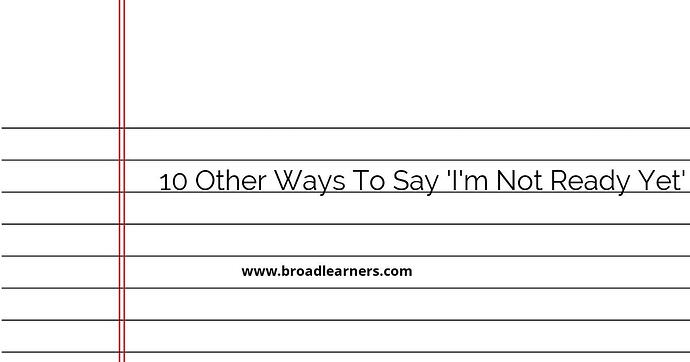When someone asks you to do something and you're not prepared or ready to take action, saying 'I'm not ready yet' might not always be the most effective or polite response. Luckily, there are several alternative phrases you can use to convey the same message in a more polite and professional manner.
- I need more time to prepare
- I'm still in the process of getting ready
- I'm not quite prepared yet
- I require additional time to be ready
- I'm still working on it
- I haven't finished preparing yet
- I'm not fully prepared at the moment
- I need a little more time before I'm ready
- I'm not ready to proceed just yet
- I'm still in the midst of preparing
Let's explore each alternative phrase in more detail:
1. I need more time to prepare
This phrase acknowledges that you require additional time to adequately prepare for the task or request at hand. It shows that you value thoroughness and want to provide the best possible outcome.
Example:
Thank you for the opportunity, but I need more time to prepare before I can proceed with this task.
2. I'm still in the process of getting ready
This phrase suggests that you are actively working on preparing for the task or request, but you are not yet at a point where you feel ready to take action.
Example:
I appreciate your patience. I'm still in the process of getting ready, and I will let you know as soon as I am prepared to proceed.
3. I'm not quite prepared yet
This phrase indicates that you are making progress towards being ready, but you are not yet fully prepared to take action.
Example:
I apologize for the delay. I'm not quite prepared yet, but I'm actively working on it and will be ready soon.
4. I require additional time to be ready
This phrase emphasizes that you need more time to adequately prepare for the task or request. It conveys a sense of importance and dedication to providing a high-quality outcome.
Example:
I understand the urgency, but I require additional time to be ready. I want to ensure that I can deliver the best possible results.
5. I'm still working on it
This phrase indicates that you are actively engaged in working on the task or request, but you are not yet ready to proceed.
Example:
I appreciate your understanding. I'm still working on it, and I want to make sure everything is in order before moving forward.
6. I haven't finished preparing yet
This phrase communicates that you are still in the process of preparing for the task or request and have not yet completed all necessary preparations.
Example:
I apologize for the delay. I haven't finished preparing yet, but I'm working diligently to ensure everything is properly taken care of.
7. I'm not fully prepared at the moment
This phrase acknowledges that you are not currently fully prepared for the task or request. It conveys a sense of honesty and transparency.
Example:
Thank you for your understanding. I want to be honest and let you know that I'm not fully prepared at the moment. I'm actively working on it, though.
8. I need a little more time before I'm ready
This phrase suggests that you need just a bit more time before you feel ready to take action. It conveys a sense of diligence and attention to detail.
Example:
I appreciate your patience. I need a little more time before I'm ready to proceed. I want to ensure that everything is in order.
9. I'm not ready to proceed just yet
This phrase communicates that you are not yet ready to move forward with the task or request. It conveys a sense of caution and thoroughness.
Example:
I understand the importance of this task, but I'm not ready to proceed just yet. I want to make sure everything is properly prepared.
10. I'm still in the midst of preparing
This phrase indicates that you are currently in the process of preparing for the task or request and are not yet at a point where you feel ready to take action.
Example:
I apologize for the delay. I'm still in the midst of preparing, but I assure you that I'm dedicated to providing the best possible outcome.
By using these alternative phrases, you can politely and professionally convey that you're not ready yet without sounding dismissive or uncooperative.
Did I miss anything? Respond below
